Problems of the Irish Revolution
Can the IRA meet the challenge?
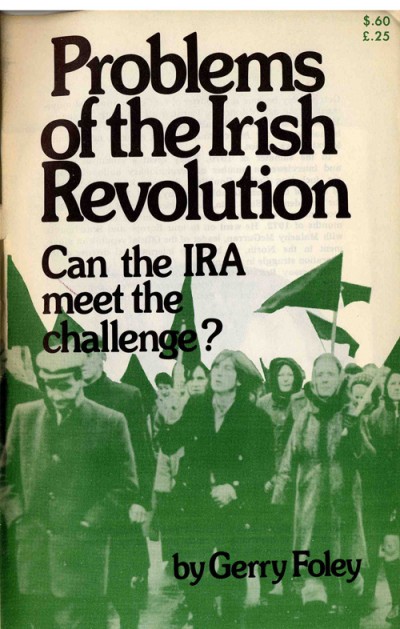
| Date: | August 1972 |
|---|---|
| Publication: | Intercontinental Press |
| Author: | Gerry Foley |
| View: | View Document |
| Discuss: | Comments on this document |
| Subjects: |
Please note: The Irish Left Archive is provided as a non-commercial historical resource, open to all, and has reproduced this document as an accessible digital reference. Copyright remains with its original authors. If used on other sites, we would appreciate a link back and reference to The Irish Left Archive, in addition to the original creators. For re-publication, commercial, or other uses, please contact the original owners. If documents provided to The Irish Left Archive have been created for or added to other online archives, please inform us so sources can be credited.
Commentary From The Cedar Lounge Revolution
11th December 2011
This document, printed in 1972, provides an overview by US activist and journalist Gerry Foley. Foley who worked for Trotskyist publication, Intercontinental Press spent some time in Ireland in 1970 and in 1972 meeting and interviewing ‘revolutionary nationalist leaders, including Cathal Goulding, the man known as the chief of staff of the Irish Republican Army, and Tomas MacGiolla, the President of Sinn Féin, the political arm of the republican movement.’
When he returned ‘in the turbulent early months of 1972… he went on to tour Europe and Scandinavia with Malachy McGurran,leader of the Official Republican movement in the North, to build an international defines of the liberation struggle in Ireland’.
The document itself is drawn from an essay that first appeared in Intercontinental Press in 1972.
In the introduction Foley outlines the circumstances that led to ‘in May-June 1968, a mass movement develop[ing] among the nationalist minority in Northern Ireland.’
And he notes ‘the rise of this movement also reflected other changes that had been accumulating beneath the surface. After the failure of the 1956-62 guerilla campaign, the traditional nationalist movement, the IRA, had been forced to rethink its historic positions. In this process it moved away from concentrating exclusively on guerrilla warfare in the name only of national unity and full independence. It began to develop a program of political action based on the immediate needs and aspirations of the mass of the people.’
He continues:
One of the first effects of the massive fighting that developed in August 1969 was a split in the IRA. The rise of communal warfare encouraged some veterans of the 1956-62 campaign, who had been opposed or indifferent to the new orientation, to break away from the Official movement and forma Provisional IRA. Although they too have been changing under the pressure of the situation, the Provisionals have generally stressed military action as the main form of fighting the oppression of the Catholic community. The Officials have tried to combine commando group activity with peaceful mass action.
And he notes:
In general the distinction between the two groups has been seen in terms of mass action vs. Guerrilla warfare. Smaller socialist groups, which had tended to discount the revolutionary potential of democratic demands, have found themselves either isolated or drawn into the orbit of one or the other militant nationalist organisation, since this was the arena where the struggle for leadership was centred.
And he concludes:
If traditionalism is not dead yet, the pressure of events and the spread of new ideas seems to have dealt it a mortal blow. In the future any radical organisation will have to stand on its political program and not its historical credentials.
In the main body of the article he discusses the then recent declaration by the Official IRA in May 19, 1972, that it was ‘suspending armed offensive operations in Ulster’. And he attempts to parse out the meaning of that statement both in terms of its direct impact and its future implications. What is of particular interest is the way in which Foley points to a range of actions, including the death of an OIRA volunteer, Martin O’Leary, during the Mogul silver mine strike in 1971 and position this within the developing approach of Official Republicanism.
He also notes the various influences on Official Republicanism from ‘British ultra-leftist and workerist groups [in Derry]’ to ‘Stalinism’ and the ‘scholastic fuzziness… of the British Communist Party’. And he argues that there is a danger that ‘since the civil rights movement has not proceeded as expected and the republican leadership was evidently not prepared politically for the actual results - that disorientation will set in’.
And intriguingly given later developments in OSF he argues that:
By its devotion to the ideals of socialism and its uncompromising fight against all the conservative forces in Ireland, the Official republican movement has won the support of a large number of dedicated revolutionary youth. By waging centralised political campaigns and by giving clear political direct, it can weld these youth into the best fighting force in Europe. The main instrument of this process, however, cannot be an ‘army of the people’; it must be the party of the Irish revolution.
That his analysis is critical but sympathetic is particularly useful in getting a sense of the time.
More from Intercontinental Press
Intercontinental Press in the archive
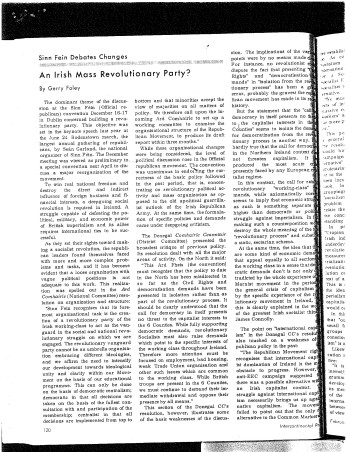
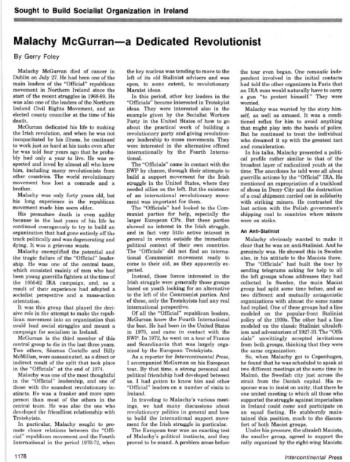
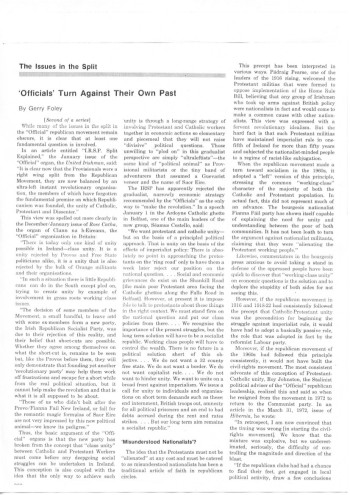
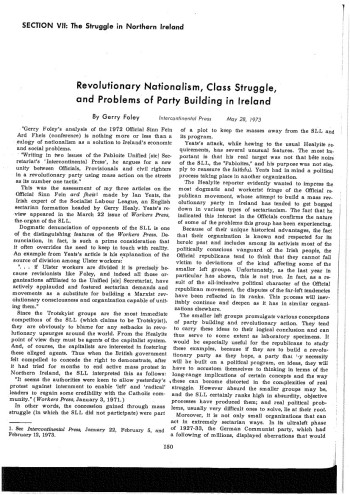
Comments
No Comments yet.
Add a Comment
Comments can be formatted in Markdown format . Use the toolbar to apply the correct syntax to your comment. The basic formats are:
**Bold text**
Bold text
_Italic text_
Italic text
[A link](http://www.example.com)
A link
You can join this discussion on The Cedar Lounge Revolution
By: tomasoflatharta Thu, 15 Dec 2011 21:15:25
The discussion on Critical Versus Uncritical Support above for movements fighting a just cause against imperialists applies today on this issue : “Free Marian Price now” – Éamonn McCann sums up the case brilliantly : http://www.derryjournal.com/community/columnists/free_marian_price_now_1_3333228 I can easily Identify myself as “repelled by Ms Price’s politics” but that is no excuse for abstaining from a clear policy. As Eamonn says “She is imprisoned without trial – in everyday language, interned.”. As Martin Niermoller said about Nazi Germany “First they came for the Communists…” . http://en.wikipedia.org/wiki/First_they_came%E2%80%A6
Have we learned the hard lesson?
Reply on the CLR
By: Admin Thu, 15 Dec 2011 23:57:49
In reply to Admin.
World by Storm wrote: “To put special emphasis on the US SWp seems to be somewhat over egging the situation.”
This too seems a bit odd. I didn’t put any special emphasis on the US SWP – it was a US SWP pamphlet which you put up and so it was that which I commented on!
If it had’ve been a pamphlet by some other group some thousand miles away, I would’ve said the same thing.
Phil
Reply on the CLR
By: Admin Fri, 16 Dec 2011 00:08:06
In reply to Admin.
Jim Monaghan wrote: “Philip, radical tourism is an awful jibe.Foley who is now over 70 sacrificed an academic career and now lives in somewhat straitened conditions suffering from diabetis.”
Jim, this sounds terribly like special pleading. Many of us have made considerable sacrifices but don’t expect to be immune to criticism because of them.
In that pamphlet it says he spent a month in Ireland in 1970 – well, if you spend a month in ireland and then write a pamphlet with the subtitle, “Can the IRA meet the challenge?” you are going to come in for some fire. Don’t like the fire? – well, don’t play with the matches.
After all, why write something with such an arrogant title and approach?
It would have been more useful if he just did some interviews with leaders and activists on the ground and made a pamphlet out of those and/or did a pamphlet which explained to a wider audience what the struggle in Ireland was about and what the different perspectives were, rather than the kind of pronouncements that he made (and that he repeated in his writings on Portugal). That would’ve been fine.
Of course, it would also have been too modest for the US SWP with its odd belief in its own version of manifest destiny.
Phil
Reply on the CLR
By: Admin Fri, 16 Dec 2011 00:13:10
In reply to Admin.
World by Storm wrote:
“In other words Foley or anyone including the SWP had every right to do so just as you do.”
I don’t want to go round in circles with you, but you are simply wrong to say this. Foley wrote about the way forward in Ireland – I haven’t written anything about the way forward in the USA. Nor would I. How on earth would I know how to make a revolution in the US, when I’m 10,000 miles away in NZ.
My objection is to anyone in the imperialist world thinking they know the way forward in an oppressed nation, especially after a one-month visit. So, no contradiction involved on my part at all in criticising Foley for his pamphlet.
Hope this clears things up.
Phil
Reply on the CLR
By: WorldbyStorm Fri, 16 Dec 2011 02:51:15
In reply to Admin.
I’m hugely unconvinced by your twist on the ‘you had to be there’ line of argument and particularly by your idea that because someone writes from a US perspective they therefore are per definition ‘imperialist’ or writing from an imperialist perspective. I think that as a journalist and a commentator nd based on successive visits Foleys approach was valid and a what you see as arrogant many would see as fair enough comment.
Reply on the CLR
By: Admin Fri, 16 Dec 2011 07:06:29
In reply to Admin.
World by Storm wrote: “I’m hugely unconvinced by your twist on the ‘you had to be there’ line of argument”
I would’ve thought that Lenin established this idea a long time ago – namely, that in order to work out the way forward for a revolution and what a revolutionary organisation needs to do, you actually need to be a participant. A foreign journalist can’t do it.
WbS also said: “and particularly by your idea that because someone writes from a US perspective they therefore are per definition ‘imperialist’ or writing from an imperialist perspective.”
But I never said Foley, or someone doing what he did, was by definition imperialist. I said the tendency of the US SWP to tell people in other countries how to make their revolutions was aping the US ruling class which tells governments and peoples in the rest of the world what to do. It’s an *adaptation* to imperialism, it’s obviously not imperialism.
Given that you seem to think this practice is OK, or certainly nothing to object to, aren’t you a little surprised that the IRA – in either of its early 1970s manifestations – never produced a pamphlet with a title like, er, “Problems of the American revolution: can the SWP meet the challenge?” Can’t you see how bizarre that would be?!
As far as I’m aware the great revolutionaries of history never wrote pamphlets with that approach. The person who came closest was Trotsky and when he did, for instance with his article on the Easter Rising, he made himself look rather silly. His later propensity for such writing reflected his own isolation and inability to affect events. And I make these comments as an admirer of Trotsky’s – but he’s a good example of the pitfalls of this approach.
Lastly, I’m actually reasonably well-disposed towards the group Foley has belonged to for several decades now; I’m even friends with a few people in it. So I have no axe to grind about Foley personally – hopefully he has moved on from the kind of attitudes and approach that was symptomatic of the US SWP and its notion that its manifest destiny was to lay out the path to power for everyone who had the misfortune not to live in the United States.
Anyway, I’m off to write a pamphlet. It’ll be called “Problems of the American Revolution: can Gerry Foley meet the challenge?” I’ll send it to you and you can stick it up on Cedar Lounge. .-)
Phil
http://theirishrevolution.wordpress.com/
Reply on the CLR
By: Ed Fri, 16 Dec 2011 12:12:48
“I suspect we probably agree on more than we disagree on.”
I’d say we probably do, Michael. I certainly think that the Provo campaign was always likely to prove a dead-end. Which brings us back to the starting-point of this thread – I think Foley’s pamphlet gives a pretty shrewd analysis, arguing that republican militarism won’t work, and arguing for mass civil resistance instead. That was a hard case to make a few months after Bloody Sunday, but he was right. Far more progress would have been made in the North after 1972 if the resistance to British rule hadn’t been militarised in the way it was (in a similar way, the first Palestinian intifada was much more of a challenge to Israel than the second one, because the first was largely based on mass popular struggle, the second was fought by a minority of guerrilla fighters against the Israeli army).
There’s other entries in the CLR archive that provide a similar view – I’d single out the edition of the Starry Plough produced by the Derry Officials in 1972 (the Starry Plough was a really good newspaper, it’d be great if all the back editions could be put up online), and the “Militarism vs. Mass Action” document produced by People’s Democracy later in the ‘70s (PD went through a phase of giving more or less uncritical support to the Provo campaign, but changed direction after a split in 1976). The good thing about these arguments is that they were made from a socialist and anti-imperialist perspective, they had nothing in common with the establishment view of the Provos in London or Dublin.
And I should say again, I felt like tearing my hair out in frustration when I heard sections of the left put forward slogans like “victory to the Iraqi resistance” or talk about supporting “any means necessary”; as you say, it was a gift to people like Nick Cohen. I never believed that the people raising these slogans actually supported bombings of mosques or markets by sectarian fanatics in Iraq, but they were leaving themselves wide open to accusations that they did. I think this was a minor factor in the decline of the anti-war movement after 2003, other things were more important, but it certainly didn’t help in trying to build a strong anti-imperialist current coming out of that movement.
As I see it, the radical left should have argued that people in Iraq had a right to take up arms against the occupation and that the occupation troops should be withdrawn unconditionally, without getting into the business of supporting the Sadrists or the Sunni groups. The only group in Iraq that deserved active solidarity from the left was the oil workers’ union, they were leading a really impressive campaign against theft of Iraq’s oil resources and demanding that the US get out, and they cut across sectarian divisions. Unfortunately there doesn’t seem to be any Afghan equivalent that we could support today, at least not so far as I’m aware.
Reply on the CLR
By: WorldbyStorm Fri, 16 Dec 2011 21:20:22
In reply to Admin.
That I’d pay good money to read!
I think we’re approaching this issue from two different standpoints though I do see the points you are making.
Firstly I’m not a Leninist so my perspective is perhaps a little different. I am though influenced by Luxemburg and think that, for example, her critique of Bolshevism in the 1917 onwards period which was very public and very open was entirely legitimate.
I think it’s entirely appropriate for comrades of whatever persuasion on the left, whether M-L, Marxist, anarchist or whoever to critique others [Marx was never behind the door in presenting critiques himself, sometimes to a withering and unreasonable degree]. Indeed I’d see it as absolutely necessary because without moving into destructive self-criticism the models of actoin and the actual actions the left engages in have to be held up to examination at all times both by people involved directly and those that are not. That reflection by others can feed usefully into the self-reflection by those directly involved. In a way that’s why like Ed I’m not hyper critical of assorted UK groups like the RCP, the RCT, etc, etc which you’ll all find in the Archive, whose attitude to the conflict could often be unbelievably unnuanced but essentially boiled down to ‘support for the IRA come what may’.
Secondly, and this is again a subjective thing so I think we can entirely differ legitimately, reading Foley’s output I don’t see the negative attributes you do. Perhaps because I am interested, not having been there at the time, in the personalities and dynamic and I find his take on it genuinely interesting, not least because much later I was in the WP and it’s interesting to try to mesh OSF as was with the WP as was. So perhaps I see this as a useful document above and beyond any proscriptiveness that you see. Which isn’t to say that that isn’t there, but I’m not seeing it in the way you do.
Reply on the CLR
By: WorldbyStorm Fri, 16 Dec 2011 21:23:41
In reply to Michael Carley.
We try not to do insulting here Michael 🙂
To be honest this has been one of the most interesting general discussions on a piece in the Archive, albeit it’s spun off on some unexpected tangents.
Reply on the CLR
By: MIchael Carley Fri, 16 Dec 2011 21:44:17
@WBS I like the CLR for its generally fraternal/comradely spirit of informed disagreement, so you’re right: people don’t generally do insulting (of other contributors, at least).
Oddly enough, though it might have been a tangent, it’s a tangent that seems to be intersecting the Christopher Hitchens thread, so it’s something that is worth considering. There is a long history of people, honest, dishonest, or confused, who are seen as renegades from some one holy and apostolic church or other, so it’s a perennial on the left. (And where does Victor Serge fit into all of this?)
Anyhow, I’ve never seen a tangent I couldn’t head off on, which can amuse my students now and again.
Reply on the CLR
By: WorldbyStorm Sat, 17 Dec 2011 08:50:12
In reply to MIchael Carley.
Hah, mine neither re tangents. But that’s part of the fun of interacting with them.
BTW, I think you’re right about Hitchens and this thread.
Reply on the CLR
By: phillyworkersvoice Sun, 15 Apr 2012 15:00:40
Reblogged this on Philly Workers' Voice Blog and commented:
Problems of the Irish Revolution by Gerry Foley. 1972
Reply on the CLR
By: John Meehan Sun, 22 Apr 2012 11:22:40
I have just learned that my close friend and comrade, Gerry Foley, has died.
I spoke with him via skype phone a few weeks ago – typically, in the middle of answering his probing questions about Irish politics, he broke off to describe a beautiful fluffy cat on the wall which was taunting Mexican dogs driven to heights of truly demented craziness in the high heat of the midday sun.
Reply on the CLR
By: the national question and self-determination a compilation of links « Philly Workers' Voice Blog Sun, 22 Apr 2012 12:47:07
[…] Problems of the Irish Revolution; Can the IRA meet the challenge? A Socialist Workers Party pamphlet by Gerry Foley […]
Reply on the CLR
By: Brian Hanley Sun, 22 Apr 2012 16:30:47
Very sorry to hear about Gerry Foley’s death. He was generous to myself and Scott Millar when we started researching the Lost Revolution. His two pamphlets and various articles (usually in Intercontinental Press) about the Officials in the early 70s are well worth reading. His interviews with Tomas Mac Giolla and Cathal Goulding are particularly good for a snapshot of their movement in a particular time and place. His obituary for Liam McMillen is also an impressive article.
Reply on the CLR
By: Gerry Foley, Socialist and Republican: 1939 − 2012 « The Cedar Lounge Revolution Mon, 23 Apr 2012 15:52:10
[…] his life. As a socialist with a profound interest in Ireland and matters Irish and as the author of a number of pamphlets directly linked to that his views of the situation, particularly in the early to mid 1970s are of […]
Reply on the CLR
By: Left Archive: Ireland in Rebellion, Gerry Foley, Including Interviews with Cathal Goulding, Chief of Staff IRA and Tomás Mac Giolla, President, Sinn Féin. March 1972 « The Cedar Lounge Revolution Mon, 30 Apr 2012 01:38:48
[…] in March 1972 this document was written by Gerry Foley who passed away last weekend. It complements another document written by him during the same period which analyses aspects of the conflict on the island. Foley at […]
Reply on the CLR
By: Jim Monaghan Mon, 30 Apr 2012 11:47:05
In reply to Brian Hanley.
If Gerry wrote a history of the Sticks he could easily have called “Lost leaders of the Irish Revolution”
Reply on the CLR
By: Left Archive: Selection of writings on the Official Sinn Féin/Irish Republican Socialist Party split in 1975 – including a tribute to Billy McMillen and interview with Séamus Costello, by Gerry Foley « The Cedar Lounge Revolution Mon, 04 Jun 2012 02:52:19
[…] documents were written by Gerry Foley (see here and here) for Intercontinental Press between 1974 and 1975 about the split in Official Sinn Féin which […]
Reply on the CLR
By: the national question and self-determination a compilation of links « Resistance! PHL Tue, 31 Jul 2012 00:34:03
[…] Problems of the Irish Revolution; Can the IRA meet the challenge? A Socialist Workers Party pamphlet by Gerry Foley […]
Reply on the CLR